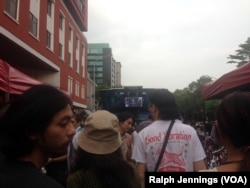Activists in Taipei, inspired by new laws in parts of the United States, kicked off a campaign this month to legalize marijuana, but they are given low odds of a breakthrough against the traditional anti-drug ethic of East Asia.
Some 300 people launched their effort April 20 with a demonstration outside the Taiwan parliament compound in Taipei. They asked that marijuana be regulated as a medication instead of as a drug – the possession of which carries three years in prison.
“We believe this thing can be handled according to the rules on medication," said Luo Yi, spokesman for the group Green Sensation, which organized the demonstration. "To break it out and classify it as a drug we think won’t be helpful in solving any problems. We hope marijuana can be legalized and hope to promote it first for medical use.”
The pro-marijuana campaign is unlikely to effect change, a spokesman for the Taiwan justice ministry said last week. A ruling party lawmaker called Taiwan too conservative to accept legalization.
If Taiwan legalized marijuana, it would be the second place in East Asia to go in that direction after Thailand. Thai legislators agreed in December to allow the licensed medical use of marijuana. Police across most of the region see marijuana as a drug worthy of fines and prison terms.
Colorful rally
At the April 20 demonstration, stalls displaying hemp clothing lined a blocked-off Taipei street. A disc jockey spun dance music from the rally stage where people in their 20s and 30s danced in colorful, loose-fitting clothes.
Marijuana conveys a “culture” such as that of “hippies” in the United States, Luo said. Today’s younger Taiwanese are “open” to the culture, he added. “Some of our people have seen research and reports from other countries and realize, hey, (marijuana) is not so bad after all,” he said.
Activists are taking legal cues from the United States, as well. More than 30 U.S. states allow some form of legal use.
Americans in Taiwan are often surprised to face prison time when caught with small amounts of marijuana for personal use. In April last year, the de facto U.S. embassy in Taiwan sent citizens an advisory citing an “increase in arrests related to marijuana over the last several months” and a reminder that “penalties for possession, use, selling or trafficking of illegal drugs in Taiwan are severe.”
Green Sensation intends to hold a series of events over the next year including another mass demonstration to advance its cause. By early 2020, Luo said, Green Sensation plans to approach legislators as well as local city council members to advocate changes in marijuana-related laws.
Slow change
No legislator is keen now on introducing a legalized-marijuana bill, ruling party lawmaker Lee Chun-yi said on Saturday. Taiwanese people in general have expressed little demand for changing the laws, he added.
“I think Taiwan basically is still a bit conservative, so to open that aspect of society now, I think society has no way of accepting it,” he said.
However, law enforcement academics and health officials have begun to discuss the laws on marijuana as usage becomes “more severe” over the past few years and authorities hope not to “lose control,” said Liao You-lu, a criminal investigation professor at Central Police University in Taiwan.
Marijuana cases are too numerous now for police to discover all of them, Liao said, as the substance has become an expensive habit for Taiwan's middle class. Health officials still see marijuana as dangerous enough to be regulated, he said.
“Taiwan’s situation is still in a state of being controlled, because if you started to permit it, at first it would become extremely serious,” Liao said.








